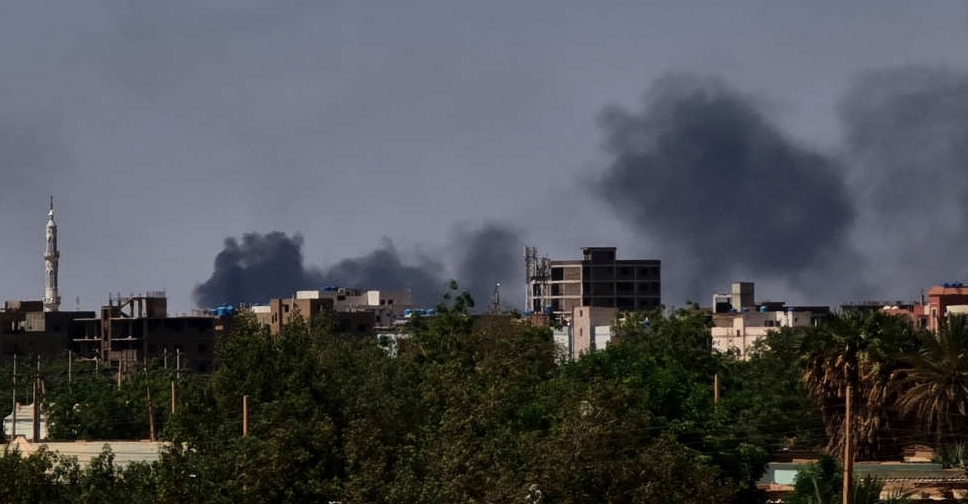
Heavy gunfire echoed around Khartoum again on Friday as civilians trapped by fighting in the Sudanese capital said the army and rival paramilitary forces were ignoring their plight.
"It's been four days without electricity and our situation is difficult... We are the victims of a war that we aren't a part of. No one cares about the citizen," said Othman Hassan, 48, a resident of the southern outskirts of Khartoum.
Despite multiple ceasefire declarations, the army and the paramilitary Rapid Support Forces (RSF) appeared to be battling each other for control of territory in the capital ahead of proposed talks.
So far, the leaders of both factions have shown little public willingness to negotiate after more than two weeks of fighting.
The sudden collapse into warfare has killed hundreds, triggered a humanitarian disaster, sent an exodus of refugees to neighbouring states and risks dragging in outside powers, further destabilising an already restive region.
Across swathes of Khartoum, factories, banks and shops have been looted or damaged, power and water supplies have been failing and residents have reported steep price rises and shortages of basic goods.
"Sudan's warring armies are showing reckless disregard for civilian lives by using inaccurate weapons in populated urban areas," Human Rights Watch Sudan researcher Mohamed Osman said in a report documenting damage to hospitals and water treatment plants caused by fighting.
The Sudanese Doctors Union said one of the country's main maternity hospitals, Aldayat in the adjoining city of Omdurman, had been looted and occupied by forces on Thursday.
In total, it says 17 hospitals had been damaged by fighting and 20 forcibly evacuated since the start of the violence. Sixty of the 88 hospitals in Khartoum are out of service, it said, with many of the rest only offering partial service.
The fighting stems from tensions between two rival factions, the army and RSF, which had shared power after a coup in 2021. The conflict has derailed an internationally-backed plan to usher in democracy and civilian rule after a 2019 popular uprising that unseated Islamist strongman Omar al-Bashir.
AID, FOOD LOOTED
The United Nations pressed the warring sides to guarantee safe passage of aid after six trucks were looted.
UN aid chief Martin Griffiths said he hoped to have face-to-face meetings with both sides to secure guarantees from them for aid convoys.
The UN World Food Programme (WFP) estimated that $13 million to $14 million worth of food destined to people in need in Sudan had been plundered so far.
About 100,000 people have fled Sudan with little food or water to neighbouring countries, the United Nations says.
The United Nations refugee agency (UNHCR) called on Friday on governments to let civilians fleeing Sudan into their territory.
"We're advising governments not to return people to Sudan because of the conflict that's going on there and also advising that this is a refugee movement," Elizabeth Tan, UNHCR's Director of International Protection, told reporters at a briefing in Geneva.
"There are likely to be high levels of international protection needs amongst those who are fleeing."
The UNHCR said more than 56,000 people had entered Egypt through the Qostol and Agreen crossings since May 4, including at least 52,500 Sudanese, according to figures from Egypt's foreign ministry.
The agency had said on Thursday it planning for an outflow of 860,000 refugees and returnees from Sudan and, with partners, will need $445 million to support the displaced until October.
“The humanitarian situation in and around Sudan is tragic - there are food, water and fuel shortages, limited access to transport, communications and electricity, and sky-rocketing prices of basic items,” Raouf Mazou, UNHCR's Assistant High Commissioner for Operations, said.

 UK inquiry finds 'chilling' cover-up of infected blood scandal
UK inquiry finds 'chilling' cover-up of infected blood scandal
 Iranian President Raisi killed in helicopter accident, state media says
Iranian President Raisi killed in helicopter accident, state media says
 ICC prosecutor seeks arrest warrants for Israeli, Hamas leaders
ICC prosecutor seeks arrest warrants for Israeli, Hamas leaders
 Assange given permission to appeal against US extradition
Assange given permission to appeal against US extradition
 Israel intends to broaden Rafah sweep, Defence Minister tells US
Israel intends to broaden Rafah sweep, Defence Minister tells US




